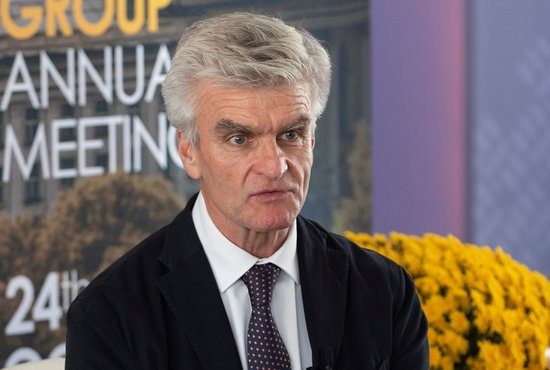26.11.2019 Hubert Cottogni: Bulgarian Development Bank is a leader in investing in social programs
 The new financial framework the European Investment Fund (EIF) will be able to benefit from for venture capital investments in small- and medium-sized enterprises is far more ambitious than its predecessor – the Junker Plan (EFSI), said Hubert Cottogni, EIF Deputy Director and Head of Mandate Management, at the Annual Meeting of EIF Shareholders hosted by the Bulgarian Development Bank.
The new financial framework the European Investment Fund (EIF) will be able to benefit from for venture capital investments in small- and medium-sized enterprises is far more ambitious than its predecessor – the Junker Plan (EFSI), said Hubert Cottogni, EIF Deputy Director and Head of Mandate Management, at the Annual Meeting of EIF Shareholders hosted by the Bulgarian Development Bank.
Under the Juncker Plan, the EIF entered into financing agreements with intermediary banks (such as the BDB) to fund projects worth nearly EUR 20 billion. It was planned that they would bring about a total increase of EUR 155 billion for the funding of smaller and medium-size enterprises. The reason is that financial institutions of the sort of BDB provide within the European Union the co-financing of entrepreneurial projects needed to start those projects.
And while the total amount of the Juncker Plan, aimed at saving the European Union economy from the effects of the Great Recession, was EUR 410 billion, its successor, InvestEU, will be nearly 50% larger, with its budget already being EUR 650 billion. In the 2021/2027 period, it will bring together the European Fund for Strategic Investments and the 13 financial instruments that are at the disposal of the EU.
However, managing the large investment funds over the next programming period will not be an easy task. "We need to focus more on thematic distribution. This will be the new challenge," Cottogni said. "We will have to split the projects into sectors. Unlike, for example, the Juncker Plan, which was more of a crisis exit measure. Now we will be able to be prepared in different topics and areas."
On the other hand, EIF will need to develop a cooperative system whereby national development banks can cooperate directly with the European Commission. This is another novelty compared to the Juncker Plan. "I believe these are two really important changes with which we will enter into the new financial framework," Cottogni said.
Another challenge will be the way funds are distributed by the national development banks, said the top financier, who nevertheless hinted that InvestEU would facilitate the funding in the European Union and the funding model is important because the new program is more ambitious than its predecessor and generally aims to attract even more investment across the EU.
According to Cottogni, the Juncker Plan has already been successful with initiatives such as providing funding for micro- and medium-sized enterprises, so these mechanisms will be retained with InvestEU as well. It is forecasted that the pilot programs, which were implemented under the current funding plan in the field of social activities, are also to be expanded.
Cottogni also pointed out that Bulgaria, in the face of BDB, is among the leaders at European level in financing social activities. "Many national development banks across Europe are not so well-placed to pay attention to and work with the social tools of the program," he said. "That is why we highly appreciate BDB’s activity and their achievements in social impact projects and funding thereof. Now, with this new agreement, I believe we can do much more for Bulgaria together."
Hubert Cottogni is Deputy Director of the European Investment Fund. He is responsible for the creation and management of the EIB mandates and for the European Strategic Investment Plan (Juncker Plan), the COSME, InnovFin, EaSI, ERASMUS programs and more. He is a Board member in several funds, such as GGF (The Green for Growth Fund) and EFSE (The European Fund for Southeast Europe).

